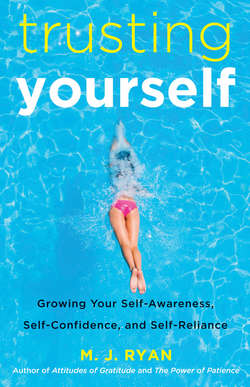Читать книгу Trusting Yourself - M. J. Ryan - Страница 15
На сайте Литреса книга снята с продажи.
We Can Let Go of Shoulds, Musts, and Oughts
Оглавление“I must do this because they will be disappointed if I don't.” My friend and teacher Albert Ellis refers to this impulse as “musterbating.”
—Wayne D. Dyer
In her book Living Happily Ever After, Marsha Sinetar tells the story of two hermits who lived together for many years on a deserted island, praying. One day, along came a church official in a boat who proceeded to interrogate them as to how they prayed. “We just pray,” they responded. “No,” said the church father, “you must say the right prayer.” So he began to teach them his church's prayer. The hermits had a lot of trouble remembering it. Over and over they forgot. The church leader worked hard to teach them; finally, confident that they had it memorized, he jumped into his boat and took off. Miles away from the island, he heard his name being called. Looking out to sea, he saw the two hermits, walking toward him on the water. “Wait, wait!” they exclaimed. “What comes after ‘Give us this our daily bread’?”
What a marvelous lesson about purity of heart and strength of faith being more important than all the shoulds in the world. From birth we are told by those around us what we ought to and must do. Your family, religion, school system, workplace, media—each and every structure in existence adds its ideas to the pot of dos and don'ts. By the time we are adults, these voices are not only outside us, but inside as well: I should go to the party; I ought to send a baby shower gift; I must work ten hours a day or else look like a slacker. These musts, oughts, and shoulds can be so strong that what we want in our heart of hearts can be completely hidden—even from ourselves.
The word should comes from the Anglo-Saxon “sceolde,” and scolding is just the effect it has on us. Indeed, shoulds and musts set up civil wars inside our psyche. Psychologist Neil Fiore points out that as soon as we have “one voice say[ing], ‘I should,’ another says, ‘I don't want to.’” So we go back and forth between the two, feeling bad no matter what we end up doing.
When we live from a list of shoulds, we end up in a tremendous amount of self-recrimination and regret. This is a great energy sap. Wayne D. Dyer puts it this way: “When we discuss what we should have done, or what we could have done, or what we would have done, we are not tuned in to our reality system. No one could have done anything differently than they did. Period.” Trust in ourselves gets us off this no-win roller coaster because it gives us the ability to do what we think is right and not look back.
These days, I'm practicing letting go of shoulds, musts, and oughts. I say, Sorry, I'm too tired to come to the party, even if it's at the last minute. (Friends can attest to how often I've bailed on them.) I let my work speak for itself rather than worrying whether others will think me a slacker for taking time off. And when I do find myself stuck in a should, I seek a solution that I can do whole-heartedly—pick flowers from my garden for a friend rather than buy a gift, for instance, if that feels more authentic.
What I've learned from outside the “should” pile is that life is so much simpler. How about you? Would you have more time, more mental energy, by not dwelling on the oughts in your life and acting more from the wants? You might even get to something on your list that you actually enjoy.
Here's an added benefit: You let other people off the hook, too, because you're not as focused on what they “should” be doing either. Ah, freedom—it feels pretty darn good!
